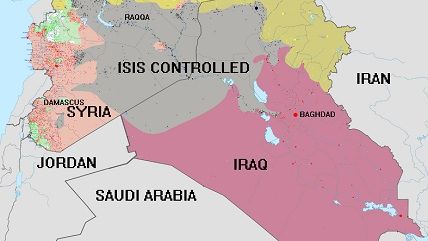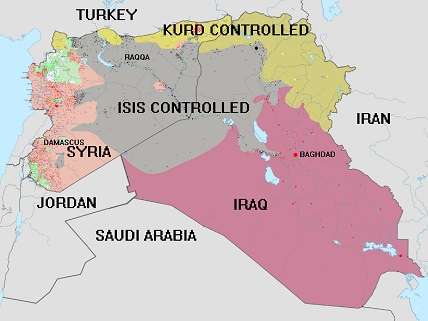The Iraq War Never Ended
U.S. mulling more troops, new base, "complete" strategy


News this morning reports the Obama administration is considering* sending up to 500 additional U.S troops to Iraq, for training, naturally, as well as opening up a new military base in Anbar. U.S. forces largely, but not completely, withdrew from Iraq in 2011 per a status of forces agreement negotiated between Iraq Prime Minister Nouri al-Maliki and President Bush that President Obama tried and failed to renegotiate for a later withdrawal date. While Obama spent the 2012 presidential campaign taking credit for ending the war in Iraq, when the Islamic State in Iraq and Syria (ISIS) began wreaking havoc in the country last year, Obama distanced himself from the decision to withdraw U.S. troops from Iraq, saying it wasn't the decision he wanted.
U.S. combat troops and trainers left Iraq in December 2011, but left behind a Marine embassy guard attachment for the U.S. embassy in Baghdad—the largest in the world—and up to 5,000 private military contractors for security and training purposes. Notably, Congress never revoked the authorization for the use of military force in Iraq it passed in 2002, although the Obama administration hasn't found it necessary to invoke since sending troops back to Iraq in 2014. Instead, current military action against ISIS falls under "Operation Inherent Resolve," which the administration claims is covered by the 2001 authorization for the use of military force against Al-Qaeda and associated forces, passed in the wake of Al Qaeda's September 11 terrorist attacks. The Obama administration has sought a new, what it says is limited, authorization for the use of military force against ISIS. Congress appears interested neither in passing such authorization nor in stopping the actions that authorization is supposed to retroactively apply to.
Rep. Charlie Rangel (D-N.Y.) compared the possible decision to send 500 more U.S. troops to the 3,000 already in Iraq to the Vietnam war. "This is exactly how Vietnam started," he told reporters this morning. "If you don't think you're putting them in harm's way, you're not living in the real world." How far removed from the real world is President Obama, whose decision it's been to send troops back to Iraq and who is deciding now whether to send more? He admitted at a press conference Monday that the U.S. didn't "yet have a complete strategy" to fight ISIS, a statement The New York Times described as "jarring honesty." Obama blamed a lag in commitment from Iraqis and a lack of cooperation from Turkey. As The Times noted, Obama's defense secretary, Ashton Carter, previously said the Iraqis had shown "no will to fight." Government forces are regularly defeated by smaller extremist forces, and thousands of fighters have left the anti-ISIS coalition over U.S. participation. The Times noted, correctly, that without regional cooperation "no American strategy, no matter how brilliantly drawn, will save them." It goes deeper than that, as the incompleteness problem illustrates.
An American strategy may, by definition, be unable to save the region from ISIS because it can only save itself by itself. As Nick Gillespie wrote last month, the U.S. "won't help fix all the problems in the world until it realizes that it can't fix all the problems in the world." With a year and a half left in his presidency, it's not too late for President Obama to come to that realization and to act on it in a way that could have a lasting, positive effect, on regional security, by removing the U.S. from the anti-ISIS equation and thus robbing it of a powerful tool to keep its organization in place and its opponents from cooperating, stepping up and defending themselves.
*This afternoon the president reportedly decided to send the additional troops.


Show Comments (57)